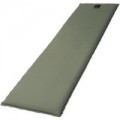Weight
The weight of a tourist rug depends both on the materials of manufacture and on the geometric parameters, type (inflatable or self-inflating) and the purpose of the model. It can increase due to the presence of an additional thermal insulating layer based on aluminium foil, etc. Note that this parameter is of priority when transporting on oneself (on foot, especially in difficult conditions) — for such cases, models with a
minimum weight are best suited. In situations of tourism in transport, or going out into nature, the convenience of the product will play a greater role than its weight.
Permissible weight
The maximum weight that the rug can carry without consequences. This parameter is relevant primarily for inflatable and self-inflating products (see "Type"), because mats, due to the dense structure of the material, are highly resistant to loads, and it is almost impossible to overload such a mat during normal use.
Of course, the permissible load must not be exceeded — this can lead to damage to the rug. However, it should also be borne in mind that its value is usually indicated for situations where the weight is distributed more or less evenly over the surface; under point loads, the product can be damaged even by a weight that is less than indicated in this paragraph. To put it simply, if a full-size “sleeper” model (see “Type”) has a load capacity of 100kg, a 95kg hiker can comfortably lie on such a mat, but trying to stand up with their feet can end up sad, since the load at the point of contact will be much higher than calculated.
Filler
The material that plays the role of the internal hardware of the rug. Note that this parameter can be specified both for self-inflating products and for traditional mats (see "Type") and even for inflatable mats — in them, the internal volume can be supplemented with filler to improve thermal insulation.
— Polyurethane foam. A material that is extremely popular among self-inflating mats, but also found in karemats. It is distinguished by strength, durability, resistance to temperature extremes, as well as good thermal insulation properties. Polyurethane foam filler can have different densities; the higher it is, the better the mat is suitable for extreme conditions, but the more expensive it is and the more it weighs (the latter is especially noticeable in self-inflating models).
— Synthetics. Usually, polyester-based filler is called synthetic. One of the main advantages of this material is resistance to moisture, which includes the ability to retain most of the thermal insulation properties when wet, as well as a high drying rate. On the other hand, the initial level of thermal insulation of synthetics is somewhat lower than that of polyurethane foam, and it does not tolerate long-term storage when rolled up. This material is found only in inflatable and self-inflating models.
— Polyethylene foam. A material found mainly among mats, but occasionally used in self-inflating mats. Note that in karemats, polyethylene foam usually plays the ro...le of not only the core, but also at least one of the surfaces (upper and/or lower); but for self-inflating products, shells are made from other materials. If we talk about practical properties, then this material has good thermal insulation properties, is resistant to moisture, and is inexpensive. On the other hand, polyethylene foam is sensitive to UV radiation, and in general it wears out faster and loses elasticity than the same polyester foam.
— Fluff. Natural down (duck or goose) is mainly used in high-end expedition equipment (see "Purpose"). The main advantage of such a filler is its excellent thermal insulation performance. On the other hand, such a rug should be protected from moisture as much as possible — in the wet state, all its advantages are lost, and the filler dries for a long time. Another disadvantage is that fluff can cause allergies; therefore, for people prone to allergic reactions, before a serious trip, it's ok to check such a rug in advance.
Case
The presence of a
cover in the delivery set of the mat. Such an accessory provides additional protection against scratches and damage, and in general it is more convenient to wear the product in it than in home-made packaging; while the weight of the cover is so small that in most cases it can be completely neglected.
Dimensions (LxWxT)
The dimensions of the rug in the unfolded position. This parameter allows you to evaluate how much the area of the product will be enough for your purposes, and whether it will fit in the intended location — for example, in a tent.
Each individual size has its own specifics. So, choosing a classic rug (see "Type") in length depends on the height of the user, in width — taking into account the physique (
wide tourist rugs will be a burden for the average person, and narrow ones will be uncomfortable for large people). Among the seats, the situation is simpler, they all have approximately the same size, sufficient for their intended use. The thickness, usually, characterizes the softness of the product: the larger it is, the better the mat smooths out irregularities and the more pleasant it is to lie on it (ceteris paribus, of course). On the other hand, for a thick rug it is more difficult to achieve compactness when folded, so an increase in thickness affects either the dimensions of the product during transportation or the price.
Dimensions (folded)
Dimensions of the rug when folded. This parameter determines how much space the product will take up during transportation. Note that in this case, “perfect” sizes are usually indicated, corresponding to the most dense packaging according to all the rules; actual dimensions may be slightly larger, depending on the quality of folding.

